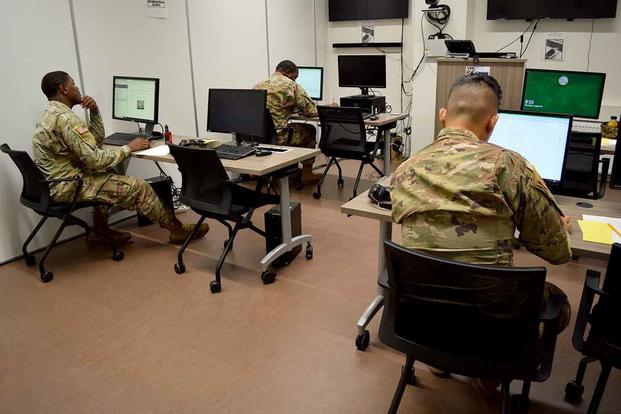Mandatory training is an often unpleasant, time-consuming fact of life in the Army, but some reserve commanders want to rethink how big of a priority it is.
The Army requires soldiers to sit through roughly a dozen training courses per year, such as suicide prevention and cyber security fundamentals. Though the courses cover service priorities, they often boil down to soldiers clicking their way through dull online training.
The courses also eat up valuable time that is in short supply, especially for those serving in the National Guard and reserve. They are difficult for the reserve components to squeeze into their already tight training schedules.
Read Next: More Same-Sex Couples Eligible for Survivor Benefits After VA Policy Change
"I basically have to lock everyone in a computer room for a day or two to get my numbers up when they could be training," a National Guard colonel told Military.com on the condition of anonymity because they were not authorized to talk to the press. "Sure, I can be up to date, but those things have nothing to do with my ability to go to war."
Some Army officials are encouraging leaders in the force to better organize their formations' time and place less of an emphasis on the mandatory training.
"When I became chief, that was one of the biggest complaints I got," Gen. Daniel Hokanson, chief of the National Guard Bureau, told Military.com. "Soldiers sign up, and airmen, and no one really wants to spend a weekend doing [the training]. So, [we] basically got it down to one time a year, and the rest of the year they should be good."
Hokanson said he encouraged commanders under him to pick one drill weekend a year for soldiers to knock out the training.
But even when consolidated, the courses take up a sizable chunk of the Guard's training time.
National Guard and reserve units usually train only two to three days per month and conduct a field exercise for two to three weeks in the summer. Those units have to juggle the same requirements as the active-duty force, including qualifying on their weapons, passing fitness tests and staying sharp on their military jobs -- all while juggling their civilian lives.
For both components, one weekend is already set aside for yearly health exams, in many cases, with another one or two commonly set aside for a holiday party or ceremonies. Furthermore, part-time units may have limited access to Defense Department computers used for mandatory training.
Some of the service's top officials, such as Sergeant Major of the Army Michael Grinston, have tried to get commanders to reevaluate training priorities, though none has suggested tossing out all mandatory courses.
"Where do we assume risk? We have to take a look at what real combat is and what lethality means," Command Sgt. Major. Andrew Lombardo, the Army Reserve's top enlisted leader, said at an Army conference in Washington, D.C., on Oct. 11. "There's value to the required training. But if we have to make a choice between being combat ready and that mandatory training, my command is going to give or take risks on those mandatory requirements."
Commanders do have the power to direct formations to skip training, but that decision comes with risk. For example, if suicide prevention was cut from a unit's training schedule, there could be self-harm among the soldiers and that could also reflect poorly on the commander.
However, the Army did eliminate a handful of mandatory courses in 2018, including media awareness training. That move was spurred by former Defense Secretary Jim Mattis' directive for service leaders to audit their training requirements.
"It is this type of burdensome requirement that unnecessarily weighs down our
Army from focusing on its core mission," Army Secretary Mark Esper, who later served as defense secretary, and Gen. Mark Milley, who served as Army chief of staff at the time, said in a memo.
-- Steve Beynon can be reached at Steve.Beynon@military.com. Follow him on Twitter @StevenBeynon.
Related: Time in the Field, Longer School. The Army's Basic Leader Course May Get a Big Overhaul.













